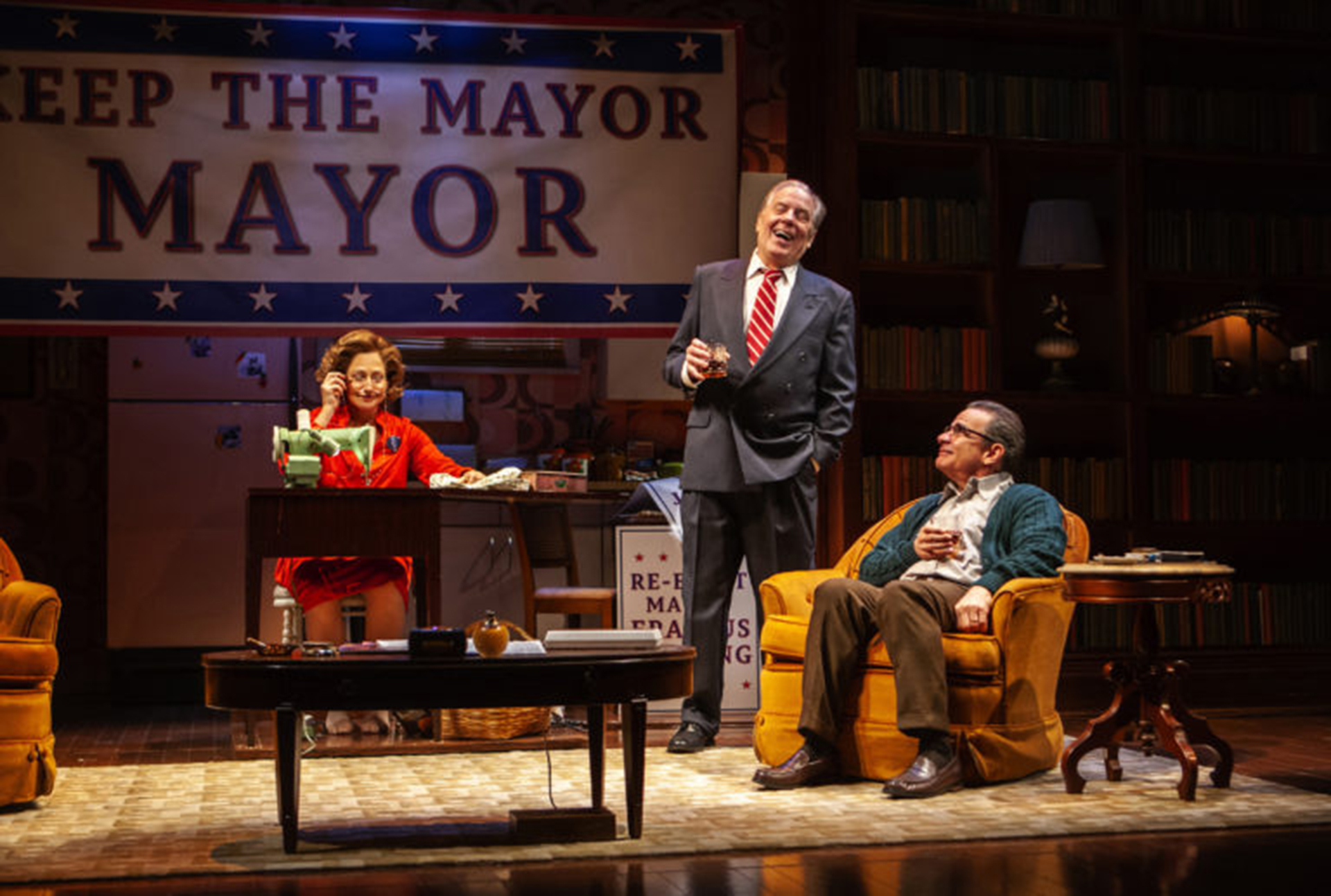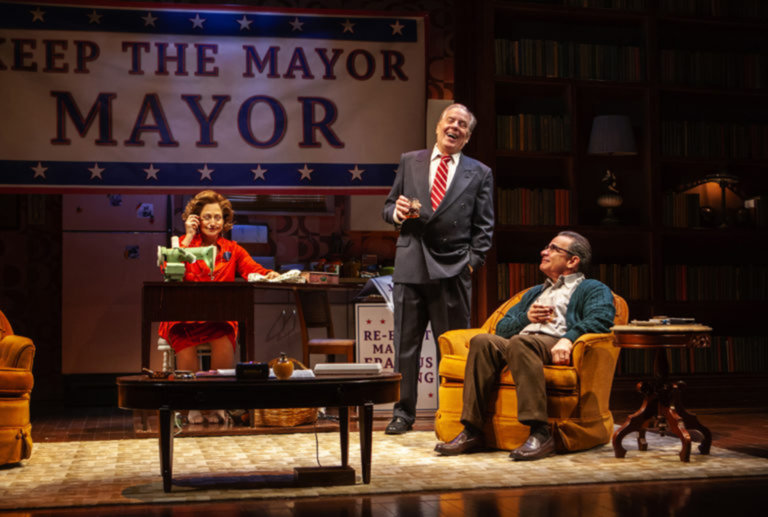Reporting From Broadway : The True Examines 1970s


The first time I saw Edie Falco on the screen, in the 1999 black and white indie, Judy Berlin, it was an arresting experience. Beyond the eerily dark story of loneliness and alienation in a Long Island suburb, there was Falco in the titular role, cheerily and awkwardly challenging the status quo, with her dream of being in the movies. In its way, it was a cuttingly comic performance.
Time, as the long-suffering mob wife in “The Sopranos,” has smoothed over Falco’s unusual and odd presence, on stage and screen. In her current role as Polly in The True she expresses gravitas, albeit with her own edge.
Written by Sharr White, this new play, directed by Scott Elliott of The New Group, is similar to White’s earlier works, The Snow Geese and The Other Place, as it studies complex characters in a state of crisis. In The Other Place, a neuroscientist, (played by Laurie Metcalf, on Broadway), faces dementia; and in The Snow Geese, the family matriarch, (played by Mary-Louise Parker), and her sons face a changing economic tide.
Here the focus is on the urban political machine in Albany, in the 1970s. As reported by a feature article in The New York Times, “Personal Loyalty: Political Whispers and Edie Falco,” the play is based on the 1977 Albany Mayoral Race in which the incumbent, Erastus Corning won, despite his waning popularity.
White’s play, while based on historical figures, including Polly Noonan, who sustained her influence even though she never held office, mingles historical truth with fiction.
As Noonan, Falco appears to be a benevolent character, fiercely loyal to the mayor, and equally committed to her husband. Peter (Peter Scolari) and she relish their mutual friendship with Erasmus (Michael McKean). And the three of them coexist gracefully, while the rumors of the mayor’s and Polly’s dalliance swirl around them.
While the play questions the nature of the relationship between Erasmus and his long-time secretary, Polly, it remains simply that, a question. Dramatically, the relevant issue is that Falco’s Polly needs McKean’s Erastus in her life. And she won’t let go.
As Albany politics goes, Noonan is a committed player. She doesn’t shy from the dirtiness of political game playing, she may even instigate it. But she doesn’t evoke demagoguery or tyranny. When Mayor Corning fires her because the rumors about them are thwarting his run for reelection, she continues to work on his behalf. She will do anything for the mayor, as she righteously believes that they are the cornerstone of the party, and the community.
Regardless of the crimes they commit, which include buying and selling votes in the mayoral election, these are characters with whom we empathize. Their time-honored practices seem to have sustained a healthy enough society. But when does that stop being “true”? In that respect, the title and the message are ambiguous.
The well-seasoned cast members are all credible, and engaging, including Glenn Fitzgerald as Howard Nolan, the candidate who, historically challenged Corning in the Democratic primary, and lost. And John Pankow portrays an intern who really doesn’t want a life in politics. That character appears to be fictional.
Derek McLane’s scenic design seizes on the tastelessness of ‘70s interior design. Indeed, tastelessness speaks to the bigger picture, as the righteous mayor reports early in Act I, “I’m going to stay mayor, just like Daley in Chicago.”
Fiddler on the Roof
Translated into numerous languages for performances the world over, Fiddler on the Roof is a popular tale, about tradition. That is why this Yiddish language production, directed by the Oscar and Tony-Award winning Joel Grey, for the National Yiddish Theatre Folksbiene at the Museum of Jewish Heritage, is especially rich.
Along with Shraga Friedman’s 1966 translation of Joseph Stein’s book, supertitles in English and Russian appear on a screen of homespun cloth. In Yiddish, we say, a schmatta. Indeed, the story, well known as it is, tells itself.
Here, we experience Russian village life, in the fictional village of Anatevka, during the pogroms at the turn of the 20th Century. A time when village life was losing its stability, and people who had lived in these communities for generations were being driven from the land which enriched their lives, as they enriched it.
Still, the nature of change in modern times — its frequency and predictability — is completely different from what it was then. “Tradition,” Fiddler’s theme song, written in the ‘60s by Jerry Bock, with lyrics by Sheldon Harnick, reminds us where we came from and where our roots are. But it’s really speaking to the future, not only of the Jews, but of all people who need to know about their own traditions, and where they come from.
In this Yiddish language production, the customs of the past are revealed with immediacy and urgency. Here, one cannot just say goodbye to a daughter who marries against your wishes. Those goodbyes are part of the diaspora, which is why separation has such an intense meaning here. Sadly, it still has that meaning for many immigrants in our own country.
As a musical, of course, Fiddler has its own theatrical history on Broadway with two fairly recent revivals. The 2004 production starring Alfred Molina, and the 2015 revival with Danny Burstein showed us a Tevya of a more contemporary sensibility.
The day I saw the show, Adam Shapiro played the role of Tevya, which is usually played by Steven Skybell. In fact, Shapiro portrayed the father so soulfully that one could feel life being torn asunder. A large man, with a big presence, he gives his all to this role.
A wonderful addition to the show, extracted from Chagall’s paintings, is Lauren Jeanne Thomas as the Fiddler, who becomes Tevya’s alter ego. She expresses in music, and in posture the emotions that leave him speechless. A beautiful violinist, she is graceful to watch.
Among the gifted cast of actors, singers, and dancers, Jackie Hoffman, (television’s “Feud: Bette and Joan”) is especially humorous as the matchmaker. Her deadpan humor, and the look of oppression on her face, speak a thousand words.
As choreographed by Joel Grey and Stas Kmiec, the Russian youth dance like ballerinas, not bullies.
Due to the popularity of the show, which opened in July, it’s being extended through October 25, with rumors of a Broadway run.



